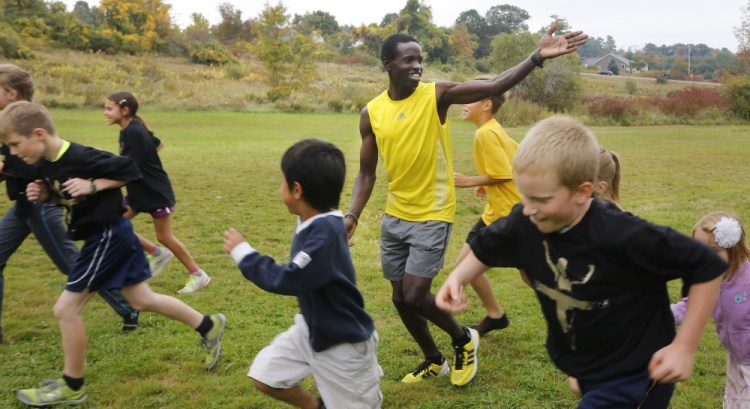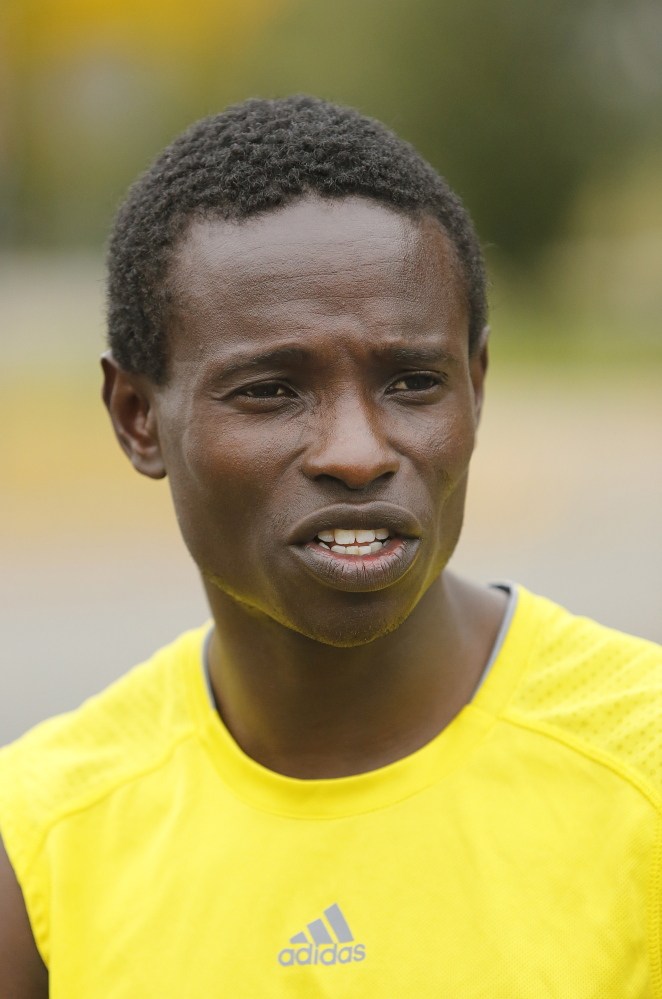AUBURN — Moninda Marube leaned into the back of an open-hatched SUV. He pulled out a handful of child-sized black T-shirts emblazoned with a gold image of a woman breaking a finish-line tape and started handing them out.
“Do you love running?” he asked a dozen grade-school children gathered in the parking lot of Auburn Middle School on a recent overcast weekday. “Do you have friends who love to run?”
With an infectious smile, endearing attitude and unerring instincts on how to connect with children, Marube is the perfect recruiter for an after-school running program. He’s also the subject of a documentary that will begin filming Sunday morning at the Maine Marathon in Portland, where Marube hopes to break the course record.
“It’s a big story,” said filmmaker Ramsey Tripp.
Marube contends he was a victim of human trafficking.
The native of Kenya says that shortly after arriving in the United States in 2010 he was exploited by an unscrupulous agent who kept more than a dozen runners under his control by withholding travel expenses and prize money provided by race directors. The ordeal followed Marube’s struggle to get out of Kenya amid violence that erupted in the wake of a disputed presidential election in December 2007.
At 35, Marube now has found a home in Maine. For the past two summers, he has overseen a Police Activities League running club he started with Edward Little High School cross-country coach Dan Campbell. Marube looks forward to Sunday’s race as the first step of a new life that, if all goes according to plan, will include a six-month run from Maine to California, a website devoted to raising awareness of human trafficking and childhood obesity, and a special type of visa that could help Marube gain permanent resident status.
“It marks the first understanding of who Moninda Marube is and what I have been always wanting to do,” he said. “It’s that sense of fulfillment that I’ve run for the cause I believe in.”
TROUBLE IN PARADISE
Meagan Dube, who works with Marube through the PAL Center and summer running program, has become executive director of the nonprofit Escape From Freedom that is the umbrella organization for the documentary, website and cross-country run, which also will raise money for 25 PAL centers in 17 states along the route.
“It has quite a few meanings,” Dube said of the title. “It mostly deals with his experience escaping illiteracy and poverty and tribal genocide (in Kenya).”
After hiding out in Nairobi for a time – staying inside one house for nearly a month – Marube managed to travel to Spain and Australia, where his lack of training showed in poor results in races he entered. Eventually he secured a visa and raised enough money to come to the United States in March 2010.
But his troubles weren’t over.
He arrived in Texas, won a marathon in Arkansas that, to his surprise and disappointment, gave him a big medal but no prize money, and eventually wound up in Minnesota as part of a running club whose manager, Marube said, exploited vulnerable African runners.
Marube was one of up to 14 runners who shared two bedrooms. The women would sleep on the beds, the men on the floor, he said. The agent took a 20 percent commission on any prize money, but also charged for rent, food, utilities and travel.
“He writes everything down,” Marube said. “Remember you ate this much and did this much and now, the only thing you have left out of this one thousand (in prize money for winning a race) is $40. It was that kind of life. I realized I’m not making anything.”
Geneva Lamm, race director of the Little Rock Marathon, remembered Marube as “gracious and kind” after the 2010 race and was not surprised to hear about his troubles with the manager.
“It was always an issue for us because his runners would come and then he would demand we make payment to him,” Lamm said. “It just got very weird.”
Larry Barthlow, the elite athlete coordinator for the Beach to Beacon 10K Road Race, only deals with agents approved by the International Association of Athletics Federations (IAAF). Just because a runner hails from Kenya or Ethiopia doesn’t mean he or she will have automatic success in the United States.
“The people who have become unscrupulous are the people in Ethiopia or Kenya trying to make money off running because they think it’s easy,” Barthlow said. “They fill these kids’ heads full of dreams that the streets are paved with gold. They’re not.”
Marube and Marcus Jaynes, his Portland-based immigration lawyer, declined to name the manager or club for fear of retaliation.
“When I try to expose a scam like this, I’m endangering my family back home,” Marube said. “That’s why I’m a little bit cautious. But at the same time, I have to do it, because there are people there who can’t speak it.”
HOPING FOR A U VISA
Auburn Police Chief Phil Crowell Jr., a member of the Human Trafficking Work Group for the Maine Attorney General’s Office, looked into Marube’s case and made inquiries to colleagues in Homeland Security Investigations. They interviewed Marube and eventually opted against pursuing a federal case.
“It’s so challenging,” said Crowell, who said human trafficking is not always of the sort portrayed on television where “you find a cargo container (filled) with young girls from Asia.”
“You look at this situation,” Crowell said. “You have an individual who was vulnerable, who was in a situation where he didn’t have control over his passport, where the money he earned didn’t come to him. It meets the definition. You just don’t have enough there for prosecution.”
Still, Marube’s cooperation with law enforcement coupled with his contributions to the Lewiston-Auburn community should help his application for what is called a U visa. About 10,000 U visas are granted each year to foreign nationals who are victims of certain crimes, including human trafficking.
“With a U visa,” explained Jaynes, Marube’s immigration lawyer, “you need an official from a law enforcement agency to certify that the foreign national was helpful in an investigation of qualifying criminal activity.”
In other words, not something like simple assault. Crowell, the police chief, said an agent with HSI could provide that certification. If not, Crowell would do so himself.
“Moninda is a great asset to (our) community,” Crowell said. “We’re fortunate to have him in the city of Auburn.”
THE AUBURN CONNECTION
After nine months in Minnesota, Marube was able to hide in the cab of a tractor-trailer – abetted by the driver, who knew a mutual friend – and returned to Texas. Unfortunately, the living situation wasn’t much better. The heat didn’t work. The house he shared was infested with bedbugs.
“Life was so hard,” he said. “To be able to buy food, it was tough. And back home (in Kenya), people expect you are in a blessed land. They want money. They consider you as the only hope. If they knew what you were going through . . . ”
A return to the 2011 Santa Barbara Marathon in California proved providential for Marube, who had won the race in 2010 while based in Minnesota. One of Campbell’s former Edward Little runners, Rusty Snow, is the race director and Campbell serves as the race’s technical director.
Campbell’s daughter, Jan Boyce, noticed Marube’s agitation at the post-race party.
“He wanted the prize money ($2,500 for first place and a course record) in cash,” Campbell said. “My daughter talked to him and realized he was in some emotional pain. At that point, he talked to me and I realized he was in trouble.”
Campbell provided a bus ticket to Maine. After Marube reached Auburn in January 2012, Campbell became something of a father figure to Marube, welcoming him into in his Auburn home and becoming his coach. It was Campbell who connected Marube with Crowell, the police chief, and helped Marube overcome a distrust of police officers that dated to his time in Kenya.
Tripp said Marube’s life turned around because of Campbell, a person he could finally trust.
“My perception of Moninda, from the things he has said to me,” Tripp said, “is that he saw Dan really pouring his heart out, not just to Moninda but to other people as well.
“And Moninda changed from coming to America to get money to get out of poverty to, now he’s here and safe and he doesn’t care about getting rich. He wants to help other people. He really wants to care about people because he had somebody care about him.”
Marube’s cross-country run is scheduled to begin next spring and finish in November, fittingly, at the Santa Barbara Marathon, where a hard life finally took a turn for the better.
Sunday morning, Marube will take a shot at the Maine Marathon course record of 2 hours, 21 minutes, 12 seconds set two years ago by Dan Vassalo.
“That would be my goal,” Marube said. “But we take each day as it comes.”
Send questions/comments to the editors.





Success. Please wait for the page to reload. If the page does not reload within 5 seconds, please refresh the page.
Enter your email and password to access comments.
Hi, to comment on stories you must . This profile is in addition to your subscription and website login.
Already have a commenting profile? .
Invalid username/password.
Please check your email to confirm and complete your registration.
Only subscribers are eligible to post comments. Please subscribe or login first for digital access. Here’s why.
Use the form below to reset your password. When you've submitted your account email, we will send an email with a reset code.